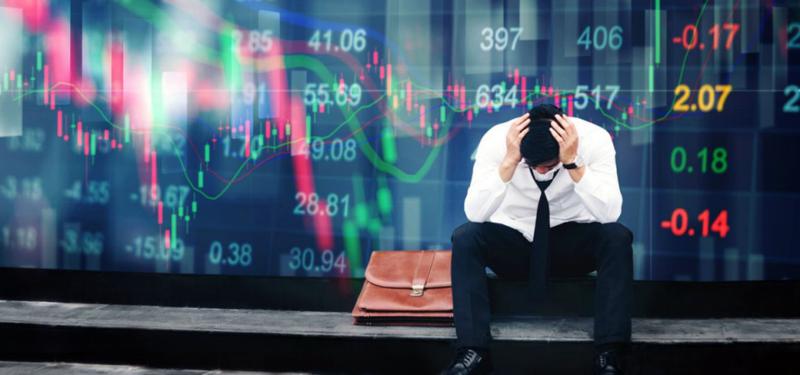As the pandemic is ravaging the whole world, exacting a historic toll on economies and societies, it is no time to draw conclusions but high time to start soul searching to redress the many mistakes made in the past few months.
The United States saw and should have understood how China, Taiwan, and South Korea handled the infection, and even learned from Italy, where it blew up well before it arrived in the US. But it apparently chose to ignore the evidence and pursue the pipe dream of upholding a market that had been doomed to recession for months.
This cost the US and world many lives, people who didn’t volunteer for a war, but were “drafted” into it, and thus more difficult to accept by US people, and it deeply dented the US status and global leadership. As authorities forecast between 100,000 and 240,000 dead, this looks like it could be the largest bloodshed on American soil after the 19th century Succession War, something that American history tells us could have grave consequences for American politics and perhaps could also swing the November presidential elections.
Whatever happens in the future much will also depend on a profound reassessment of what the US did right or wrong in this crisis.
Propaganda War
Moreover, many in Europe and America are peddling the idea that authoritarian countries like China, unlike democracies such as the US or European countries, are better geared to apply the strict quarantine rules necessary to bring the spread of the disease under control, short of a cure or a vaccine.
Yet perhaps this is deeply not true, and China’s success against US and European failures thus planted a seed of deep mistrust and animosity between the US and China that will feed the ongoing bilateral propaganda war.
In fact, there are rules and discipline of war, and rules of peace. Democracies are not unable to wage wars and win them. But after wars, they revert to freedom. Authoritarian systems basically don’t change the rules in peace and war. Now democratic countries should realize these are very exceptional times, almost like times of war. It’s not about China – it’s about the world.
Democratic South Korea and Taiwan did well. Massive testing, investment in IT infrastructure, social solidarity (following instructions by medical authorities), and simple availability of hospital beds and equipment are the common factors, as David Goldman eloquently put it.
That proves that democracies can do better, not worse, in these trying times – provided they realize these are trying times and stop pretending everything will go back to normal next Monday.
Moreover, people were already angry at China before all this – imagine what will happen after the epidemic and now that Beijing tried to deflect blame. This should be the real focus for Beijing. Stop being defensive and cope with the real problems that made this epidemic start in the first place.[1]
The Catholic Church is in danger like perhaps never before. If the Pope were to get infected and die, a conclave would be called in the middle of the pandemic. Then about 120 elderly cardinals from all over the world would travel to Rome to meet and discuss succession in the middle of the contagion. It would be a logistical nightmare, and simply many could get sick and die for it. In times of past plagues, the cardinals were largely already in Rome and therefore already in harm’s way. But now the Church has become very different, far more global, with unparalleled liabilities. In this situation, it is just extraordinary how the Pope continues to risk his life and the life of his Church to perform his religious duties.
The Italian confusion and the EU muscle
In all of this confusion, Italian politics sticks out like a sore thumb, and its tribulations could be an indication of difficulties facing each country.
Italian political debate since March 25 – that is, since the ex-chairman of the European Central Bank Mario Draghi wrote in the Financial Times – is all focused on him and on the issues he raised: a great stimulus plan for the economic recovery of Italy and the EU after the epidemic.
For days now domestically and abroad Draghi has overshadowed Prime Minister Giuseppe Conte, whose internal and international credibility and personality are much weaker. Meanwhile, almost to recover some luster, in the past few days Conte met the Pope, and had a phone call with American President Donald Trump. But the premier didn’t offer much substantial for Italy.
The rumors in Rome are that the balance now stands on an understanding: Conte will lead the emergency of the epidemic and then Draghi will arrive for the reconstruction. This is because, the consensus seems to be in Rome, changing Conte at this moment would frighten even more the already substantially panicked population.
But if China’s experience can tell us something, it is that the emergency of the epidemic could be very long.[2]
Almost two and a half months after the coronavirus alarm began on January 23, the situation in China has not yet returned to normal, although there have been improvements. We don’t not know when the plenary assembly of the Chinese parliament (the National People’s Congress), originally scheduled for March 5, will be held, and visas of foreign residents have been suspended indefinitely.
The visa suspension is upsetting for many foreign residents, who feel very unsafe: they have no rights, no claims on Beijing. Moreover, unlike in other countries, they have no permanent residence and years of life in China could simply be cancelled with the stroke of a pen. This could have massive long-term repercussions in Beijing’s economic and social dealings with foreigners.
Of course, in the coming days, the weather should gradually warm up, and this should help the global battle against this atypical pneumonia, but there is no certainty. And there is no certainty that the current drive to reopen production activities in Italy and in other parts of the world will not lead to extremely dangerous resurgences of the epidemic, something that happened in recent days in Hong Kong and possibly in China.
The coronavirus emergency could continue for months, and the Conte-Draghi back-and-forth could go much further than expected.
In the meantime, the international context, which strongly affects Italy, is in great upheaval. In Hungary, Viktor Orban asked for special powers, which could indicate a dangerous authoritarian drift on the continent. But Orban understands the internal and international situation well.
Inside there is the coronavirus that risks going out of control; outside there is an EU that is struggling to take on short-term initiatives. Furthermore, countries like Poland and the Czech Republic may be tempted by the same Hungarian drive and a chill of Brussels towards Budapest would deepen the existing rift between ex-Western and ex-Eastern Europe.
This, in turn, would strengthen extreme right groups such as the AfD in Germany, which could reinsert into the continent a neo-fascist inclination like a century ago. In the face of the radicalism of certain European right-wingers, the Italians are milder, and risky short-circuits of mutual encouragement could begin, just like in the 1920s.
On the other hand, just like a century ago, right-wing populism justifies itself by standing up against left-wing populism and the rigidity of the present elites. Italy for example has a public debt of 140% of its GDP, bought to a large extent not by the Italians (who do not trust the government in Rome much) but by the EU and US funds.
These do not give money away to Rome, but lend it at very low rates, today between 1% and 2%. If these rates rise above 3%, Italy will go bust. But Germany, the US, France, and Italy’s other “enemies” (as they are referred to in some populist papers) try to keep rates on Italian debt low to save the country, while many politicians in Rome not only don’t know what to do, but they don’t even know what to say.
The reality is that there is no one else in the world with the muscle or the desire to take on the over 2 trillion Italian debt. Moreover, the money is lent almost for free – that is, what over time means a gift to Italy.
It is true that China has over one trillion in US debt, but that is basically a complex bargain: China lends money to America, which then uses those funds to finance its trade deficit toward China itself, on the order of around $500 billion per year. In Italy, there are simply no numbers to set up such an exchange. China could perhaps buy a trillion dollars in Italian public debt, but Italy could never bear a trade deficit with China of almost 30% of the Italian GDP.
The Italian border and General Coronavirus
Thus, Italy has returned to geopolitical confrontation, testified by Russian and Chinese activism in Italy and by the media coverage Italy gave them.
But their strategic designs are different.
Russia wants to split or at least weaken the EU, which contains it from nearby. In this, Italy today, as during the Cold War, is precious. China, on the other hand, has different intentions. It wants to have a strong base in the EU and to strengthen the EU as a strategic counterweight to the US and Russia.
Perhaps the measures proposed by Draghi should be seen in this context.
Italy can’t hope to be supported by issuing Eurobonds or resorting to the ESM (European Stability Mechanism) without drastic and radical reforms of the Italian political-economic system.
It is not so much the consolidation of the past Italian debt; it is the uncertainty of future debt. If Germany and the northern European countries sacrifice for Italy without sufficient guarantees, this will stir up the worst neo-fascist and anti-Italian sentiments in those countries, which history should remind us has never helped Italy.
Then, the structural reforms in Italy and the guarantees required by Germany are insurance inside and outside. Italy is in fact unreliable squared: first, because in 20 years, since entry into the single currency, the debt-to-GDP ratio has not improved as promised and as for example Germany’s did; and second, because this government and this parliament appear weak and inconsistent.
After all, the sentiment is shared by the Italians, who despite being the world’s largest savers are the only ones, among developed countries, that export their funds abroad on the order of 50-60 billion euros per year.
Let a good crisis go to waste?
In this there is the coronavirus crisis, and everyone knows nobody is willing to let a good crisis go to waste.
Who is going to use a better “general coronavirus”? Diseases, like weather, are circumstances that can be used to defeat an enemy.[3] The rebellious slaves in Santo Domingo used yellow fever to defeat the French troops. Napoleon was beaten by dysentery and typhus, cleverly managed by Russian General Kutuzov during the invasion of Russia. Will someone strike the enemy with its management of the coronavirus?
This is already happening. The slowdown in economic activity has dumped oil prices and kindled complex trade and political tensions between energy producing countries. Saudi Arabia, with the lowest production costs for oil, is using this advantage against its enemies. Russia or Iran could be pushed into an economic crisis because with low oil prices, which make their production too costly and can eventually bankrupt them. Iran, already deep in economic recession, it is suffering because of a massive spread of the virus. It can buckle and break under the pressure of oil prices below its production costs, and this may also be the Saudi goal irritated by Tehran’s support for war in Yemen or Syria. The possible fall of the present Iranian government could be a low hanging fruit of this contagion and it could send shock waves to the whole Middle East and Central Asia.
Russia on the other hand, after having accrued massive reserves in gold, and presently under the pressure of low oil prices, may want to use the occasion to replace at least partly the international use of US dollar with that of gold. The ongoing American massive injection of money into the market, two trillion dollars, to buttress the shaky US economy, could put the greenback under pressure as international means of exchange and gold could partly replace it. The weakening of the US dollar as international financial standard, could dent the present global order, as set after WW2 and the end of the Cold War, and move it into new unpredictable directions.
All of this is already happening, yet they only indirectly deal with the epidemics. But dealing with disease directly could be far more complicated. Using the disease against your enemy could be fine if, like the slaves or the Russian Cossacks, some populations are largely safe from the contagion. But this is not the case, and therefore perhaps everybody should join together to make the necessary adjustments to fight and survive the disease.
Then the U.S. has a lot to learn from China in this crisis,[4] as well as from China’s neighbors who were quick to realize the importance of what was happening and cherry-picked and adapted experiences from Beijing.
This not new. The west won Cold War against the USSR not because it backed dictators but because it passed liberal and labor laws that de facto drained the appeal of communism to the western lower classes. In order to win China on its propaganda war the US should not fight China head to head but it should learn from what China does right and better.
China should do the same with the US if it wants to win too. If the soviets had learned from the U.S. during the Cold War, like America did, it would have been different. In the end the soviets had political liberalization without market freedom. China did the opposite, has had market liberalization without political freedom. The truth is that the two work together as three centuries of evolution of modernization prove.
China might want to learn from this before its temporary gains may backfire.
[1] See http://www.settimananews.it/informazione-internazionale/the-coronavirus-and-tale-of-two-milks/
[2] See https://www.news1.news/i/2020/04/coronavirus-second-return-pandemy-so-hong-kong-reveals-our-future-to-us.html . Weeks after Hong Kong was considered safe and it lowered its guard, the contagion blew up again.
[3] See Frank Snowden Epidemics and Society, 2019
[4] See https://asiatimes.com/2020/04/covid-19-focus-on-what-china-did-right-not-wrong/






